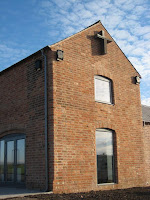Ratios of ingredients, in whatever quantities you like:
- 2lb Seville oranges
- 1 lemon
- 4 pints water
- 4lb sugar
Steps:
- Chop oranges and lemon in half and simmer in water for 2 hours until soft. Pan should have a thick bottom, otherwise danger of sticking and burning later.
- Scrape pith and seeds out of halves into sieve, and strain water. Mash pith etc through sieve and collect goo back in pan with halves and water. Take a hand-held liquidiser to it. Or, you know, use a liquidiser then put back in pan.
- Add sugar, and stir in until crystals dissolved, while heating.
- Boil furiously for about 45mins. I haven’t worked out the exact time yet. Delia says 15mins, but she uses proper jam sugar, and it definitely needs longer than that. Don’t put the lid on, otherwise it’ll boil over and make a MASSIVE mess. Test by putting a teaspoon on a plate in the freezer for 5mins. It’s done when pushing with fingernail produces wrinkles.
- Let marmalade rest 15mins. If scummy, put a tiny bit of butter in. Meanwhile, heat the jars and lids in the oven.
- Fill jars, don’t bother with wax disks, screw lids on tight while still hot. Label if you can be bothered.
Our connection to the interweb-thingy was down last night, but nothing more sinister we think than our ISP doing a bit of work on it after office hours.







